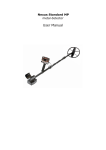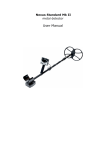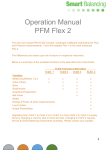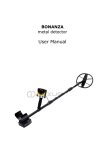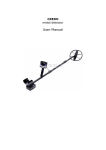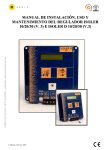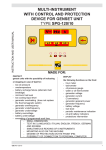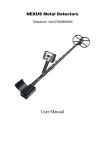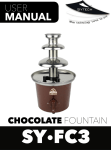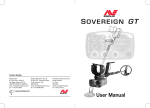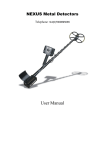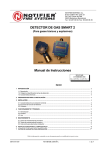Download Nexus Standard MP
Transcript
Nexus Standard MP Metal Detector User Manual Table of contents. 1. 2. 3. 4. 5. 6. 7. 8. 9. 10. General description – page 3, 4 Assembly & Preparation – page 4, 5 Controls – page 5, 6, 7, 8 DDM – Definite Discrimination LED Meter – page 6 Discrimination Control – page 6 Ground Balance Control – page 6 Threshold Control – page 7 Sensitivity Control – page 7 Volume Control and Power On/Off switch. – page 7 Dual Tone Control – page 7 Mode (Iron Rejection) toggle switch – page 7 Battery Test toggle switch – page 7 Mineral Controls – page 8 Operation – page 8, 9, 10, 11, 12 Full Manual Set Up – page 8, 9, 10 Search method – page 10, 11 All Metal Mode – page 10 Discrimination Mode – page 11 Pinpointing – page 11 Special Modes of operation – page 10, 11, 12 Discriminating salt water on tidal beaches and salt water lakes – page 10 Discriminating all large metal objects leaving only the Smaller ones -- page 11 Discriminating all small targets and leaving only larger Metal objects – page 11, 12 Tips – page 12 Care of Nexus Standard MP – page 12, 13 Guarantee – page 13 Technical specifications – page 13, 14 Troubleshooting – page 14 General Description The Nexus Standard MP is an Analogue Induction Balance (IB) metal detector that operates in the very low frequency (VLF) range and it is designed for use on all Inland Sites, Tidal Salt Water Beaches. The Nexus Standard MP is benefiting from our new Super Dumping Technology that gives it the ability to effectively suppress by means of proper balance any kind of mineral material that exist on the ground surface. MP stands for Mineral Power. 2 The Nexus Standard MP currently may be the most efficient IB metal detector for use in heavy mineral ground conditions and strong magnetite. It may be used in any of the three basic modes of operation - All-Metal, Discriminate or Turbo Audio Mode. The Nexus Standard MP is designed to be an All-purpose metal detector, capable of finding both small and large targets at extreme depths in normal soil conditions. It is also designed to work with very high efficiency in all existing types of mineral soils and magnetite (black sand). The standard coil supplied is the 10”DD and this is ideal for almost all searching operations. There are 3 different search coils currently available for the MP that can be used as accessory with the Nexus Standard MP. DD shape search coil range. - 13"DD at 6 kHz General search coil designed for higher detection ratio of small, medium and large targets in all search conditions. It exhibits greater depth than any other DD search coil in the MP range. Due to large search area it will find more targets for shorter period of time compared to smaller search coils. This search coils is best of all suitable for mineral conditions as its greater size will result in lower mineral interference and greater depth compared to the smaller coils in the range. 3 - 10"DD at 7 kHz It could be the best general search coil that you’ll ever need. It exhibits excellent dept and discrimination in all conditions. Very efficient in detecting small targets at great depth. Very fast in isolating individual targets. - 7"DD at 8 kHz, General search coil designed for quick scan of new detecting fields and areas. Very good for searching narrow spaces, holes and ditches. Best suited for small and medium targets in contaminated areas. Each coil is tuned to a slightly different frequency within the design range, to minimise interference from other Nexus detectors. Performance values for all Nexus detectors will be identical. To obtain the best results with the Nexus Standard MP, as with all metal detectors, it is essential to understand the settings and operation of the detector. With the Nexus Standard MP professional users can enjoy the benefits of the deep seeking Nexus technology, . As a general rule the best results will always be obtained when the Nexus Standard MP is properly set in manual mode. Therefore users will need to practice and experiment in order to obtain the best possible results on any particular site. All sites and soils are different and settings that will give good results on one site may be less successful if used elsewhere. The Nexus Standard MP is designed to detect the very deepest of targets and operates near to the limits of what is achievable with induction balance. Assembly & Preparation The Nexus Standard MP is supplied boxed and ready for quick assembly by simply attaching the two lower stem poles to the top one, tightening the collars and attaching the coil to the lower stem section, using the plastic bolt and friction washers supplied and tightened by hand so that coil is held at the correct angle to the stem; the coil cable plug is inserted to the socket in the control box and then tighten the knurled ring, taking care when winding the cable around the stem that the cable is not strained. The centre stem pole is of the same tube diameter as the top one and can be left off in circumstances where a short stem is needed; it is meant for use on steep sites, river banks, caves, ditches and similar conditions. The Nexus Standard MP is supplied with a drop in battery holder that can be used for all types of AA size batteries, (alkaline or rechargeable); a charging socket is provided to the battery box for connecting a charger unit. To insert or change batteries remove any three of the thumb plastic screws from the base lid of the battery box (the battery box is below the arm cup at 4 the top of the detector stem) and loosen the fourth screw. Turn the cover to the side. Insert the 10 batteries, in their correct alignments, into the plastic holder and make sure that all the terminals have a good electrical contact. Locate the battery holder into the compartment, ensuring the connecting terminals of the battery holder are in good contact with the two electric spring loaded terminals behind the recharge socket. Do not over-tighten the plastic thumb screws when refitting. If you wish to use headphones (highly recommended) connect your available set to the 6 mm jack socket on the battery box. The Nexus Standard MP has an internal loudspeaker so headphones are not absolutely essential. For any headphones that have a volume control, ensure that this is set to MAXIMUM and use the Nexus Standard MP Volume knob on the control box to set the volume level. Controls The Nexus Standard MP has eight rotary control knobs and three toggle switches (two located on the front panel of the control box and one underneath the control box) 5 DDM – Definite Discrimination Meter The DDM meter is based on LED technology and provides a reliable visual discrimination analysis in All-Metal Mode and Iron Rejection Mode. The bar will light RED for non ferrous and BLUE for ferrous (iron) targets. Discrimination This knob sets the level of the discrimination. Rotating the Discrimination knob clockwise (from 0 to 10) will INCREASE the level so that Iron is increasingly not detected (but high settings will result in the loss of potentially good targets). Generally, the discrimination level should be set as low as is possible; to avoid masking the smallest and deepest desired targets. Ground Balance This knob is used to set the balance of the Nexus Standard MP to suit the soil conditions on any given site. The GB control on the MP is made with a 10 turn precision potentiometer fitted with a precision multi turn dial mechanism with locking function. Threshold This knob sets the level of the threshold tone. The Nexus Standard MP may be operated in silent mode, with no audible background tone or with this tone set to give a slight tone level. In order to readily discern the faintest and smallest of signals, operation with a slight background tone is recommended. Sensitivity This knob controls the level of sensitivity of the responses. The sensitivity level setting chosen will depend on the soil conditions but, in general, the highest possible setting should be used. On contaminated or mineralised sites, it may be necessary to reduce the sensitivity to achieve more stable operation of the detector. Volume and Power On/Off switch. This knob sets the volume of the tone and responses and it is used also to turn on/off the Nexus Standard MP. This knob should always be used for setting the volume. Any volume control on the headphones should be set to MAXIMUM. When the Power is turned on an LED light above the Volume control knob will indicate that detector is turned on. 6 Dual Tone. This knob activates and adjusts the audio discrimination option and gives a high-pitched tone response for non ferrous and low-pitched tone for ferrous (iron) responses. Mode Toggle Switch Located under the control box and accessible from the hand-grip, this toggle switch is used to change operating modes. When pushed to the left, the Nexus Standard MP operates in Discrimination Mode. In the centre position, the Nexus Standard MP operates in All-Metal Mode. Pushed to the right position the Mode toggle switch will activate the Turbo Audio Mode. The Turbo Audio Mode works in relation to the Threshold level, so each time the Turbo Audio is enabled the Threshold level have to be raised (adjusted) up to allow the best possible detection range without false signals. Battery Test Toggle Switch. This is located on the front panel of the control box. It is used to check the condition of the batteries by using the DDM; if the meter bar lights one third or less of its length, changing or recharging the batteries is recommended. Mineral Control section. It consist of two rotary control knobs and one toggle switch all located on the left side of the front panel. The Coarse control adjusts the coarse level of sensitivity to minerals. The Fine control is a 10 turn precision potentiometer supplied with a precision multi turn dial mechanism with a locking function. The Fine control is meant for precise tune of the sensitivity to minerals so maximum detection can be achieved across the most difficult to penetrate mineral rocks and soils. The toggle switch in the Mineral Control section has two positions. Standard for most types of normal and mineral soils and Heavy for magnetite, Iron or other types of ore. When the Nexus Standard MP is used on normal soil the Mineral Controls should be set at 0 (minimum) and the toggle switch at standard position. General Operation and Setting Up Having assembled the Nexus, inserted batteries and connected the headphones, The Nexus is ready for use. 7 The Nexus Standard MP is designed exclusively for use by professionals. No metal detector, however powerful, will operate at its best unless it is set up properly for the conditions in which it is to be used. To obtain the best results and maximum depth and sensitivity to desired targets, the Nexus Standard MP must be properly tuned to the site and the settings to achieve this are set out below. Full Manual Set-Up Firstly, ensure that no metal is in close proximity to the coil. It is also advisable to carry out the tuning and setting up of the Nexus Standard MP away from other metal detectors or potential sources of electronic interference. Turn the Nexus Standard MP on. A tone will be heard and the DDM meter will flash. The tone will fade and the meter bar will settle after a couple of seconds. To check the condition of the batteries, turn up the Battery Check toggle switch. After the battery check is been done turn the toggle switch back down to allow the DDM to indicate metal targets. Keeping the DDM in battery check mode for a long time will drain the batteries. Holding the Nexus Standard MP with the coil well above ground level, adjust the Sensitivity control knob to minimum. Adjust the Threshold knob to obtain a minimal (faint) tone setting. Adjust the Volume knob to set a comfortable level (remembering to set any adjustable headphone volume control to MAXIMUM). Lower the coil to the ground and sweep side to side slowly to ensure that there are no metal targets in the place you are tuning the detector When you are satisfied proceed as follows. Position the coil about 3” above and parallel to the ground surface. Raise the coil gently 10” above the ground and lower back to 3” (75 mm) above ground several times. Note whether the threshold tone remains the same or if it increases or decreases in intensity while raising and lowering the coil. There should no residual tone change left after the GB is done. IF THE GROUND BALANCE IS INCORRECTLY SET THE DDM METER WILL INDICATE STRONG FALSE SIGNALS FROM THE GROUND MINERALS. 8 To achieve the best ground balance tuning, it is essential that the coil be held parallel to the ground surface at all times during the procedure. The next setting is to adjust the Sensitivity to suit the site conditions. From the minimum setting of the Sensitivity knob (set at minimum in the initial ground balancing procedure), adjust the control clockwise to increase the sensitivity. Repeat the procedure of raising and lowering the coil between 3” (75 mm) and 10” (250 mm) above the ground surface, as for ground balancing. If there is no change in tone while doing this, then the sensitivity may be increased further. For best depth, the setting should be at the maximum possible while maintaining a stable threshold tone. In highly mineralised soil conditions the Mineral Control may be adjusted to tune the detector to a stable operating condition. Setting the desired Discrimination level is done by rotating the Discrimination knob clockwise to INCREASE the discrimination level and REDUCE the sensitivity to ferrous (iron); higher than necessary settings will result in desired targets being missed. Rotating the Discrimination knob anticlockwise will DECREASE the discrimination level and INCREASE the sensitivity to ferrous (iron) targets. In general, an effective method of setting the Discrimination level, suitable for most search conditions, is by passing a rusty iron nail (about 50mm long) close to the search coil. Rotate the Discrimination knob clockwise until the iron nail is rejected in every possible position against the coil. After this procedure check if small non-ferrous targets are detectable without loss of depth. Setting the Discrimination knob at middle position will give proper discrimination of the detector in most cases. Finally, check again the threshold and volume settings for comfortable levels. The Nexus Standard MP is now set up for the particular site conditions and is ready for use. Search Method With the Nexus Standard MP set up and ready, the coil should be swung smoothly from side to side, a little above the ground surface. The sweep speed should be moderate and never too fast. It is not effective to ‘scrub’ the coil on the surface of the ground (this can also damage the coil and places strain on the stem assembly). 9 Suggested operating heights for the standard coils are: 13” DD coil: 2” (50 mm) minimum above ground surface 10” DD coil: 1½” (40 mm) minimum above ground surface 7”DD coil; any distance. However, by applying a Mineral Control up to a certain level the MP detector can effectively remove all residual ground noise and then the search coils can be carried at any distance above ground. In this case however there will be some loss of depth. Make sure that the coil is swung evenly over and parallel to the ground surface and that the coil does not rise at each end of the swing. Cover the ground in smooth, parallel swings to ensure maximum detection coverage. In All-Metal Mode, both ferrous and non-ferrous targets will give the same audio response (unless the Dual Tone function is turned on) by a sudden increase in the intensity of the threshold tone. A strong response indicates a large or relatively shallow target and a weak response indicates a small or deep target. Any audio signal in All-Metal Mode may be analysed by using the DDM meter. To analyse a signal with the Meter observe its colour response. In Discrimination Mode, good non-ferrous targets will give a clear, welldefined, two-way, repeatable audio signal. Ferrous targets will give a ‘clicking’ audio response or an indistinct and erratic response. Pinpointing is by simply X-ing the coil across the signal. The position where the signals are strongest below the coil centre indicates the target position. As with all detectors, when targets are of complex shape or are located at an angle in the soil, pin-pointing may not be entirely accurate so it is suggested that, when digging, the user allow space to avoid possible damage to finds. Special Modes of operation. Discriminating against Salt Water on wet sand or tidal beaches. After initial set-up turn on the Iron Rejection and set the GB to middle position or in the position where the ground minerals are usually balanced out. While raising and lowering the coil above the salt water or the wet sand begin turning the Discrimination knob from position 0 to clockwise direction, very slowly until the salt water signals turn into small clicks. 10 Discriminating against Large Metal Objects leaving only the smaller ones. There are some conditions where only small targets are required in a particular search; desirable targets such as gold nuggets or tiny coins. These are especially difficult to search for in contaminated conditions or in the presence of mineralised soils. To remove all large targets and leave only the desired very small objects, make sure that the Discrimination level is set to allow your desired small targets to be in the range of good (non-ferrous) targets. Turn on the Iron Rejection Mode using the toggle switch under the control box; this switch is moved to the LEFT Begin swinging the coil over any target that you wish to remove from the audio responses. While swinging the coil, start turning the Ground Balance knob from middle position to a greater numbers on the scale as slowly as possible. Keep doing so until all large targets and are removed and only the gold nuggets and smallest non-ferrous objects are left for detection. The Nexus Standard MP is now ready for hunting only those small targets. Note: Gold nuggets and all small targets are best detected at the standard ground balance setting in All Metal Mode. This procedure is only recommended in severe contamination. As setting the detector in this way will result in a high discrimination setting, while rejecting all large targets, there will be also a loss of depth for the remaining small targets as much as 50%. Discriminating against Small Targets and leaving only larger metal objects. Many treasure hunters have been looking for the perfect metal detector. One of those aims is for a detector that is capable to ignore or not detect at all small metal objects such as coins, bottle caps even ring-pulls and detect only larger metal targets such as hoards, metal pots, helmets, shields etc. To reject all small metal targets after proper Ground balance is been done turn the Iron Rejection Mode on, the Mode switch to the left. Place on the ground surface samples of all small targets that you do not wish to be detected. Start swinging the search coil closely over the unwanted targets. While doing so start turning slowly the Discrimination knob from position 0 11 towards position 10, clockwise. Keep doing so until all small targets are giving small clicks in the audio responses and giving a blue response on the DDM meter. Now the Nexus Standard MP is ready for hunting larger objects only. Tips The Nexus Standard MP may seem different in operation to some detectors presently available. Some practice and experimentation with the settings is necessary to get the best results on different sites. Users should persist and regular use over a reasonable period is likely to be needed to become proficient, especially in successfully locating the very deepest and smallest of targets. It must always be remembered that no detector can find what is not there – nor can any detector give a signal unless the coil is passed directly over that target! There will always be sites on which any single detector does not work to peak efficiency. All detectors and sites are different and a particular combination of frequency and filtering might be best on a specific site, although the range of accessory coils available for the Nexus Standard MP will allow effective operation under all conditions and for all types of targets. Site conditions will significantly affect depths and performance. Heavily furrowed, broken ground or thick stubble are all especially difficult ground types to search. Sites where the ground conditions vary to a considerable degree may require the Ground Balance to be adjusted from time to time for best results. Care of the Nexus Standard MP All metal detectors are precision instruments and require careful handling to ensure they remain in good working order. Avoid dropping, impact or violent shaking of the detector and protect it while transporting. The detector should not be used in extremely wet weather conditions, without protecting the control box and the battery. The coil assembly is fully waterproofed. 12 If water penetrates any of the boxes, switch off the detector and remove the batteries. It is suggested that the detector be placed in a warm place to dry out slowly. Mud and soil should be carefully removed, using a damp cloth or water only. Do not use detergents or abrasives and avoid getting water in the control boxes. When storing the detector for long periods or when shipping, the batteries should be removed. Avoid storing the detector in areas where it will be exposed to extreme temperatures, dust, moisture or contaminants. Do not attempt to modify or repair the detector or allow any unauthorised repair centre to do so. Guarantee The Nexus Standard MP metal detector is guaranteed for a period of 24 months from date of purchase against all manufacturing defects. The Control Box is sealed and contains no user-serviceable parts Opening the Control Box will invalidate the Guarantee. This Guarantee does not cover: Damage due to dropping, impact or accident Damage due to improper use or care of the detector Damage resulting from leakage of batteries Damage to the coil or coil cable In the event of any problem, please contact us. Any detector returned under Guarantee must be properly packed, preferably in the box supplied and be sent by insured carrier. The sender is responsible for any loss or damage in transit. A full repair and replacement parts service is available. Technical Specifications: Operating Frequency Range Coil Design Coil Weights Weight (main unit only) Coil Case Construction Audio Frequency 6-8.5 kHz DD 13”DD–650gr. 10”DD–540gr. 7”DD–350gr. 1.0 kg (without batteries) ABS plus Fibreglass Custom tuned 13 Audio Output Power Supply Battery Life Operating Modes Optimum Temperature Range Optimum Humidity Range 6mm stereo headphone jack Up to 16v (10 AA alkaline batteries) up to 14 hours All Metal, Discriminate and Turbo Audio. -15° to +60° C 0 to 85% RH Troubleshooting 1. The detector does not turn on. Check the batteries. If they are old replace them with new. Make sure the batteries are properly inserted into the battery holder and have a good electrical contact. 2. The detector is giving too many false signals. If this happens first turn the Sensitivity to 0, minimum level. Check the Ground Balance if it is adjusted correctly according to the ground balance procedure. If the problem still persist check if the soil does not contain hot rocks or other contaminants. If this is the case then use Silent Motion and /or Iron Rejection to stop the interference. Auto mode will also assist in such conditions. 3. The detector is picking up too much Iron. Check the Discrimination level according to the recommended settings or use Auto mode. 4. I only plug the search coil and detector does not work after that. Make sure that it is the correct search coil for your Nexus model. The search coils for Nexus Standard MP are not interchangeable with the lower Nexus models and vice versa. 5. One or more control functions does not work. Make sure that you know how to use those control functions according to this User Manual. In case that any of the control functions do not cause any change of response in the detector functions then return the detector to your dealer for check and possible repair. 6. The detector is unstable. Make sure not to use the detector with full Sensitivity near electrical sources and/or other metal detectors or other electronic devices. 7. The detector stopped working during rain. Nexus detectors are not water or weather proofed. Knowing that we strongly recommend that no Nexus metal detector model is used in rain. If this happens turn off the power of the detector from the Volume knob. Take out the batteries and leave the detector near a warm place for a couple of days to dry out. After that if still not working return the detector to your dealer for maintenance and repair. 14 15
















